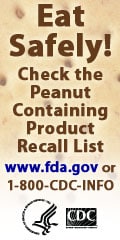According to the CDC, the signs and symptoms of MRSA include skin that is:
- red
- swollen
- painful
- warm to the touch
- full of pus or other drainage
- accompanied by a fever
According to the CDC, it is estimated that Americans visit the doctor more than 12 million times per year to address potential skin infections, many of which are caused by MRSA. And, although MRSA can affect anyone, children 0-18 years old and African-Americans of all ages are at particular risk.
Treatment for MRSA (as outlined on the CDC website) "may include having a healthcare professional drain the infection and, in some cases, prescribe an antibiotic. Do not attempt to drain the infection yourself – doing so could worsen or spread it to others. If you are given an antibiotic, be sure to take all of the doses (even if the infection is getting better), unless your healthcare professional tells you to stop taking it".
In terms of protecting yourself and your family from MRSA infection, the CDC recommends keeping cuts and scrapes clean, encouraging good hygiene and hand washing, and discouraging the sharing of personal items such as towels and razors.
Specific concerns have arisen pertaining to MRSA infection in schools, among athletes, and in other environments such as healthcare facilities. The CDC has provided for such concerns by creating online fact sheets to address these specific areas:
MRSA infection and athletes
MRSA infection in schools
MRSA in the Environment
Healthcare-Associated MRSA
Community-Associated MRSA
If you have specific concerns about MRSA or would like more information, please visit the CDC's MRSA website, call your medical provider, or call Keith Carlson, the Public Health Nurse for the town of Amherst, at 413-259-3077.





